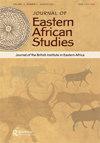‘Tribal balancing’: exclusionary elite coalitions and Zambia’s 2021 elections
IF 0.6
3区 社会学
Q2 AREA STUDIES
引用次数: 4
Abstract
ABSTRACT Presidents have access to a range of resources unavailable to challengers, and often the most important are derived from control of the state. This allows incumbents to build more inclusive elite coalitions, distribute clientelist resources to their political base and co-opt opposition politicians. Cabinet and government appointments are some of the most visible, direct and identifiable indications of elite accommodation, and African presidents are more likely to build inclusive coalitions to ensure their survival. In Zambia, balanced regional representation – popularly known as “tribal balancing” – has held an important place in the public imagination. But between 2015 and 2021, rather than using incumbent advantage to build an ethnically inclusive alliance, President Lungu used cabinet appointments and senior government positions to shore up his base. This was bolstered by an exclusionary campaign that focused on the opposition leader’s ethnicity to push the PF’s base to vote against the opposition. This article uses an analysis of cabinet appointments and coverage of the election campaign to illustrate how Lungu sought to build an exclusionary coalition and exacerbate ethnic cleavages. This contributes to debates on when and why elites might use exclusionary strategies, and when they might fail to produce the desired outcome.“部落平衡”:排他性精英联盟与赞比亚2021年选举
摘要总统可以获得挑战者无法获得的一系列资源,而最重要的资源往往来自对国家的控制。这使现任者能够建立更具包容性的精英联盟,将客户资源分配给他们的政治基础,并拉拢反对派政客。内阁和政府任命是精英通融的一些最明显、最直接、最可识别的迹象,非洲总统更有可能建立包容性联盟,以确保他们的生存。在赞比亚,平衡的地区代表性——通常被称为“部落平衡”——在公众的想象中占有重要地位。但在2015年至2021年间,伦古总统没有利用现任总统的优势建立一个种族包容的联盟,而是利用内阁任命和政府高级职位来巩固他的基础。这得益于一场针对反对派领导人种族的排斥运动,该运动旨在推动爱国阵线的基础投票反对反对派。本文通过对内阁任命和竞选活动的报道进行分析,来说明伦古是如何试图建立一个排外联盟并加剧种族分裂的。这引发了关于精英何时以及为什么可能使用排斥策略,以及他们何时可能无法产生预期结果的辩论。
本文章由计算机程序翻译,如有差异,请以英文原文为准。
求助全文
约1分钟内获得全文
求助全文
来源期刊

Journal of Eastern African Studies
AREA STUDIES-
CiteScore
3.30
自引率
7.10%
发文量
12
期刊介绍:
Journal of Eastern African Studies is an international publication of the British Institute in Eastern Africa, published four times each year. It aims to promote fresh scholarly enquiry on the region from within the humanities and the social sciences, and to encourage work that communicates across disciplinary boundaries. It seeks to foster inter-disciplinary analysis, strong comparative perspectives, and research employing the most significant theoretical or methodological approaches for the region.
 求助内容:
求助内容: 应助结果提醒方式:
应助结果提醒方式:


